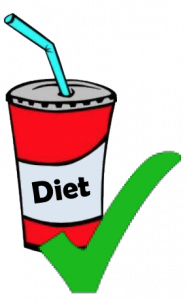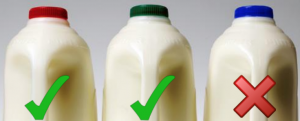3. Healthy eating and lifestyle
People with diabetes do not need a special diet; you need to follow a healthy eating diet. A healthy diet is important for everyone and means that the whole family can eat the same meals.
A healthy eating plan will help control your blood glucose levels. For some people eating a healthy diet is the only treatment they need, other people may need the help of tablets or insulin as well as eating a healthy diet.
Which foods affect my blood glucose levels?
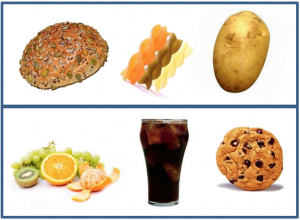 Carbohydrates are the foods that have the biggest effect on blood glucose levels. Carbohydrates break down into glucose during digestion causing blood glucose levels to rise.
Carbohydrates are the foods that have the biggest effect on blood glucose levels. Carbohydrates break down into glucose during digestion causing blood glucose levels to rise.
There are two main types of carbohydrates:
- Starchy foods like bread, potatoes, pasta, rice and cereals
- Sugary foods which include natural sugars found in fruit and milk and added sugars including table sugar, and sugar found in sweets, chocolate, puddings and sugary drinks.
If you are overweight it can make it harder to control blood glucose levels so losing weight can reduce your blood glucose levels in the long-term.
Healthy eating includes:
- Regular meals – aim to eat every 4-5 hours and avoid long gaps between meals.
- Reducing starchy food with each meal – wholegrain varieties and high fibre foods are best. All of these foods break down into glucose and will therefore raise blood glucose levels, but it is the amount we eat that is important. The amount you need depends on your age, weight and activity levels. If you are on insulin or a tablet that makes you produce more insulin, it may be important to ensure you have some carbohydrates at each meal. If you are unsure, please discuss this with your healthcare team.
- Having at least 5 portions of fruit and vegetables throughout the day – a portion is the amount that will fit in the palm of your hand. Potatoes are not included as a vegetable as they are a carbohydrate (starchy food). To help balance your blood glucose spread your fruit intake over the day. Also add green or salad vegetables to your meals, these provide minerals and vitamins to keep us healthy but will not affect your blood glucose level or your weight.
- Meat, chicken, fish, eggs and dairy products should be eaten in smaller portions, choose the low fat varieties. If you are vegetarian unsalted nuts, pulses and legumes are good alternatives.
The Eatwell guide
The Eatwell guide shows the proportions that make up a healthy diet.
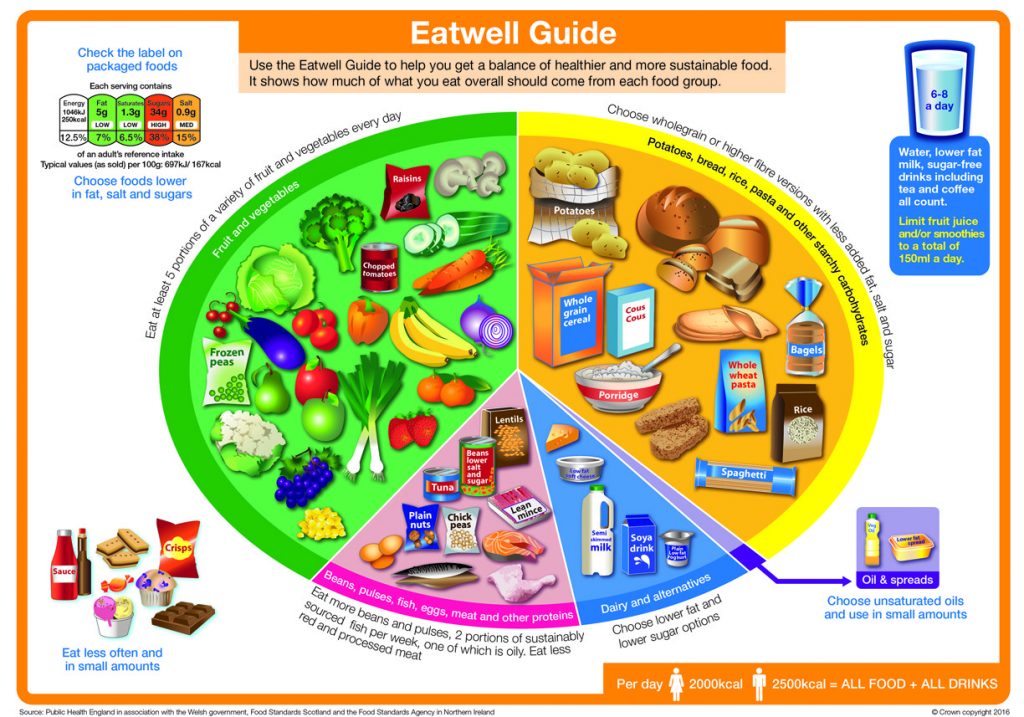
All carbohydrates break down into glucose and therefore will raise blood glucose levels. Therefore you are likely to benefit from reducing your intake of carbohydrates
The amount of carbohydrates that you need to eat depends on your age, activity levels and what are trying to achieve, for example trying to lose weight or improve blood glucose levels.
Modifying the Eatwell guide for diabetes
Suggested proportions on your plate if you are trying to lose weight and/or improve blood glucose levels:
Food labels can be used as a guide to identify values of fat sugar and salt and amounts that are considered to be low medium or high. (See Section 12 – Appendices)
-
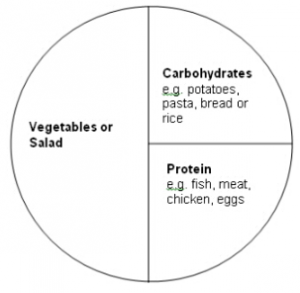 Snacks between meals – snacks are not always needed. Here are some ideas of the types of snacks you can eat between meals which meet the healthy eating guidelines for diabetes:
Snacks between meals – snacks are not always needed. Here are some ideas of the types of snacks you can eat between meals which meet the healthy eating guidelines for diabetes: - a piece of fruit or
- a pot of low fat plain or low sugar “diet” fruit yoghurt/fromage frais or
- 2 crackers (wholemeal are best) or
- 1-2 plain biscuits e.g. Rich Tea or
- a slice of wholegrain bread with low fat spread
Note: if you are on insulin or medication that makes you produce more insulin it may be important to have a snack between meals or at bedtime, discuss with your healthcare professional.
- Drinks – have at least 8 cups of fluid a day. Choose water, tea or coffee (without sugar), “no added sugar” or “diet” drinks. Pure fruit juices are high in natural fruit sugars so if you cannot resist fruit juice, limit it to 1 small glass (150ml) a day. If you wish to have a longer drink you may consider diluting it.
- Alcohol – Men and women are advised not to drink more than 14 units a week. If you do regularly drink this amount, spread this over three days or more and have at least 2 alcohol free days each week.
The type of alcohol and glass size affects the number of units. You can check units at www.drinkaware.co.uk
Fasting and diabetes
Fasting is very important to many religions but you may need to make changes to your treatment during periods of fasting. If you wish to fast please discuss this with your healthcare professional to see if you need to adjust your diabetes treatment to allow for this.
In the Islamic faith fasting during Ramadan is mandatory for all healthy adults. However the following do not have to fast:
- Children (under the age of puberty)
- The elderly
- Those who are sick or have certain health conditions
- Those with learning difficulties
- Those who are travelling
- Pregnant, breastfeeding and menstruating women
- Anyone who would be putting their health at risk by fasting, e.g. people on insulin or insulin producing medication, people with diabetic complications such as damage to the eyes, kidneys or the nerves in your hands and feet.
If your diabetes is controlled by diet only you should not need any changes in treatment of your diabetes.
If you take tablets for your diabetes you may fast but the timing of when to take the tablets will change. It is essential to take your tablets during Ramadan as they are needed to keep your blood glucose stable and keep you feeling well.
- If you normally take your tablet in the morning only, take the same dose at lftar instead.
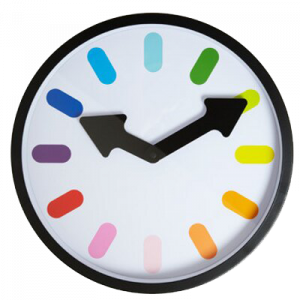
- If you normally take your tablets twice daily, then take your morning dose at lftar and take half your normal evening dose at Sehri
- If you normally take your tablets three times a day, consult your GP as the dose and timing will have to be changed for Ramadan.
If you are on insulin then you need to be very careful if you decide to fast. It is important to contact your healthcare professional to discuss this with them. It is important not to stop your insulin during Ramadan.
It is important to see your healthcare professional before changing your medication or insulin doses. You will also need to talk to a dietitian about the dietary guidelines during fasting.
Lifestyle
Physical Activity
Physical activity can help you to:
- Reduce your blood glucose
- Lose weight
- Improve your muscle and heart health
- Reduce resistance to insulin, this means your body uses the insulin it makes more effectively and this can delay the need for extra medication
- Lift your mood
For good health it is advised to aim for 30 minutes of moderate intensity activity a day, five days a week. Moderate intensity activity is any activity that makes you:
- feel warm
- perspire
- breath more deeply but leaves you able to hold a conversation
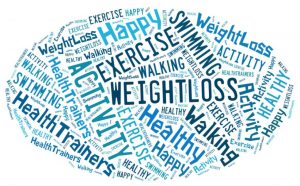
If this seems too much at the beginning try starting with 5-10 minutes and increase gradually. You should choose an activity that you enjoy and that is convenient for you as you are more likely to keep exercising. Exercise is a really important part of your diabetes management.
If you have difficulty standing to exercise, armchair exercises may be for you.
Walsall Council have a leisure centre discounted scheme called ‘Move it’. Those elegible include over 60s, low income families and those with long term health conditions. For more information ask at a leisure centre within Walsall or visit www.walsall.gov.uk/leisure
Most people are safe to do physical activity but if you are concerned or have a health condition such as heart disease, asthma or foot or eye diabetes complications then speak to your GP before undertaking physical activity.
Smoking
Giving up smoking is the most positive thing you can do for your diabetes and your health in general.
Smoking damages your blood vessels, so too does diabetes. This increases your risk of a heart attack, stroke and problems with circulation to your legs Smoking and diabetes together increases your risk of this happening by 4-9 times compared to the risk for someone who does not smoke and does not have diabetes.
If you are a smoker and want to quit you can contact your GP or the Walsall Stop Smoking Service. They offer free local support to help you to quit smoking and aim to offer the best possible support to smokers who intend to make a serious attempt to stop. Call an advisor on 01922 270477. Don’t give up trying to quit.
Weight management
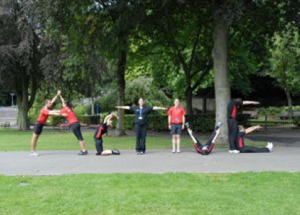 If you are overweight your body will be less sensitive to the insulin you are producing or injecting. Research shows that a 10% reduction in body weight (if overweight) can:
If you are overweight your body will be less sensitive to the insulin you are producing or injecting. Research shows that a 10% reduction in body weight (if overweight) can:
- Reduce your risk of heart disease and stroke
- Lower your blood pressure
- Make you feel better
Following the healthy eating advice and increasing your physical activity levels will help you to lose weight.

